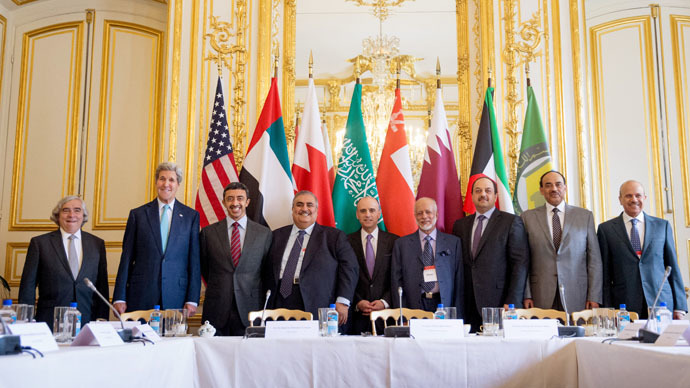‘Gulf rulers snub Camp David summit: Total disarray of US policy in Mideast’

With most of the GCC countries skipping the summit at Camp David, it reflects the failure of US policy in the Middle East, as well as its declining power and influence, geopolitical analyst Ajamu Baraka from the Institute for Policy Studies told RT.
The US will host a summit of Arab leaders in Camp David this week. Four out of the six counties of the Gulf Cooperation Council [GCC] have decided to skip the meeting. The only leaders who will attend the summit are the monarchs of Kuwait and Qatar; others will send lower-ranking officials.
RT:Washington's denying any 'snub'. So if there is no snub going on here, what is happening, do you think?
Ajamu Baraka: We’re seeing a reflection of total disarray of US policy in the region and a reflection of its declining power and influence. Of course there was a snub. Everyone recognizes that. The issue that the US has now is how they put back in place something that resembles a coherent approach to its policy and policy’s objectives in the Middle East.
RT:Why is a snub happening? Is it all about Iran here?
READ MORE: Snubbed: Most Gulf Arab rulers send deputies to Obama summit
AB: That is the major point that is the major issue. It is about what the members of the GCC recognize as the almost inevitable shift of the US away from their counties as areas of priority to try to reconcile with Iran. They have longer-term objectives to the reconciliation or the resolution of the conflict with Iran- and is directly related to their main objective which is basically to continue to put pressure and to undermine, if they can, Russia; it is to undermine the ability of Russia to continue to build itself a bit of a partition between itself and the growing aggressiveness of US policy.
RT:Is this just an empty gesture, do you think? Or there could be long-term consequences for relations between Washington and some of its Gulf allies.
AB: I think it is partly theater. At the same time that we heard these reports about conflicts between the US and Saudi Arabia, we know that basically the illegal and criminal war that the Saudis are waging in Yemen couldn’t be effectively carried out without the direct participation, the direct assistance in terms of targeting, logistics, refueling Saudi jets in midair- it could not happen without the support of the US.

There is a bit of posturing here, partly it is of course connected to the issue of Iran. It is also connected to what we see as a very strange and interesting realignment of political forces in the Middle East. That is the Saudis are objectively allying themselves more closely with the state of Israel - both in terms of what is happening in Yemen, but also in terms of what is being planned for Syria.
RT:What can Washington do to reassure its Gulf allies? And at the moment does it particularly want to?
AB: The goal was, if they could have assembled everyone in Washington, they were going to announce new rules, original security plans, there would be the inevitable announcement of more US arms being sold to the various countries in the Middle East; even though we know that, for example, in 2014 the GCC countries spent more than $100 billion on arms compared to the main concern which is Iran- that spent on the purchase of arms or other expenditures a total of $15 billion. But now with this snub it is difficult to see how they are going to be able to come out of this meeting without the kind of embarrassment that they are really experiencing.
The statements, views and opinions expressed in this column are solely those of the author and do not necessarily represent those of RT.
The statements, views and opinions expressed in this column are solely those of the author and do not necessarily represent those of RT.












